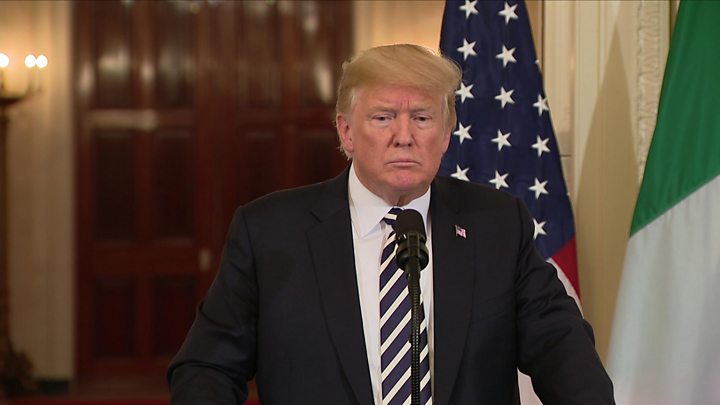
Mr Trump said he could meet President Hassan Rouhani with “no preconditions” at “any time”, after the two traded hostile threats earlier this month.
Iranian state media quoted politicians as saying such talks would have “no value” and be “a humiliation”.
In May, the US abandoned a deal which curbed Iran’s nuclear activities in return for the lifting of sanctions.
The US is deeply suspicious of Iranian activity in the Middle East and is an ally of Israel and Saudi Arabia, two of Iran’s foes.
- Trump threatens Iran: Twitter responds
- Iran faces up to its options
- Who are the winners and losers?
On Monday, Mr Trump said he was happy to meet the Iranian side, adding: “I’d meet with anybody. I believe in meetings… if they want to meet, we’ll meet.”
Such a meeting would be the first between US and Iranian leaders since before the 1979 Iranian revolution.
However, Hamid Aboutalebi, an adviser to President Rouhani, tweeted in response to Mr Trump that only “returning to the nuclear deal” and “respecting the Iranian nation’s rights” would pave the way for talks.
Iran’s deputy speaker Ali Motahari told state news agency Irna that the US withdrawal from the nuclear deal meant that “negotiation with the Americans would be a humiliation now”.
Kamal Kharazi, the head of Iran’s Strategic Council of Foreign, said there was “no value in Trump’s proposal” given Iran’s “bad experiences in negotiations with America” and “US officials’ violations of their commitments”.
What do the US and Iran disagree on?
- Mr Trump consistently opposed the 2015 nuclear deal, which saw the US release billions of dollars of frozen assets in exchange for curbs on Iran’s nuclear programme
- The Trump administration regards Iran as a destabilising force in the Middle East, arguing the nuclear deal enabled Iran to pursue a more assertive regional policy. Iran has sent hundreds of troops and thousands of volunteer militiamen to Syria, and has strengthened its military presence there
- Gulf states have accused Iran of backing Yemen’s Houthi rebels with both money and weapons, though Iran has denied this. Saudi Arabia, a key US ally, is a major adversary of Iran and has repeatedly warned about Iran’s intentions
Why did the US withdraw from the nuclear deal?
In May, Mr Trump called the nuclear accord – or Joint Comprehensive Plan of Action (JCPOA) – a “horrible, one-sided deal”.
- What is the nuclear accord?
- Pain for some of Europe’s biggest companies
- Has Iran’s economy been better off under the deal?
He alleged that the deal did not restrict Iran’s “destabilising activities” in the region enough.
Analysts also cited the influence of White House hawks including US Secretary of State Mike Pompeo and National Security Adviser John Bolton, and Mr Trump’s tendency to target major policies of his predecessor Barack Obama.
Iran insists its nuclear programme is entirely peaceful, and its compliance with the deal has been verified by the International Atomic Energy Agency (IAEA), which has said Iran is honouring its commitments.
Iran is one of the world’s largest oil producers, with exports worth billions of dollars each year. It is already feeling economic pressures, and has seen large-scale protests over rising prices and a decline in the value of its currency, the rial.
source:-.bbc
